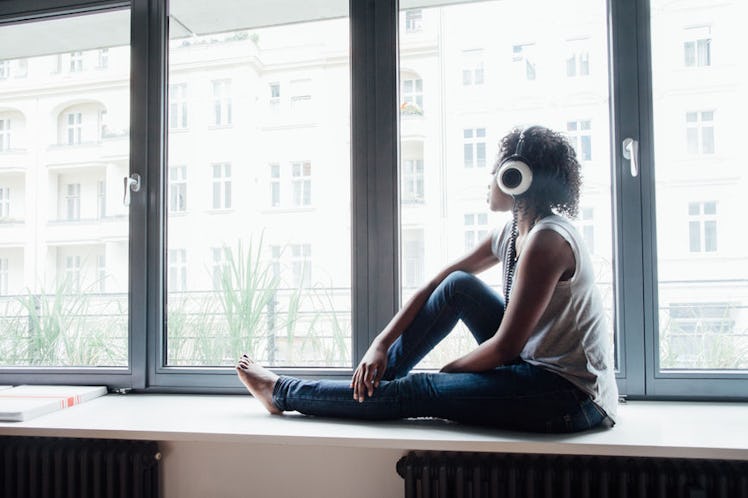
Science Says Pop Music Is Getting Sadder These Days & It Actually Makes So Much Sense
What's better than listening to a moody song on a rainy day, or a tear-inducing pop ballad when you're traveling alone on the subway, during a week when you just feel off? Music has that very unique ability to help you express complicated, deep emotions that are often hard to access on your own, which I personally believe is part of the reason why we like sad music so much, and why these songs can be so dang cathartic to listen to. What's more, according to new research, apparently a lot of pop music these days is getting sadder as a whole, and, well, it kind of makes sense.
In a report recently published in the journal Royal Society Open Science, researchers at the University of California at Irvine studied 500,000 songs — all of which were released in the UK between 1985 and 2015 — breaking each of them down by their mood. According to Business Insider, the researchers found that "pop music has sonically decreased in happiness and increased in sadness." Natalia Komarova, a co-author of the study, told The Associated Press,
"Happiness" is going down, "brightness" is going down, "sadness" is going up, and at the same time, the songs are becoming more "danceable" and more "party-like."
In other words, pop music is still pop music — i.e. your favorite artists are still dropping totally dance-worthy bops left and right — but when you look a little closer beyond the catchy beats themselves, there's some surprising sadness to be found.
So what songs, exactly, are considered "sad" by the researchers' standards, and what songs are considered "happy"?
The Associated Press reports that hits like "Stay With Me" by Sam Smith, "Whispers" by Passenger, and "Unmissable" by Gorgon City were all found to have "a low happiness index," even though these songs clearly have still been wildly successful since they've been released. On the other end of the spectrum, the researchers' examples of "happier" songs included "Glory Days" by Bruce Springsteen, "Would I Lie Yo You?" by Eurythmics, and "Freedom" by Wham!.
Of course, not all of the songs from these different eras were just categorized by one mood or another in the study. Rather, the researchers simply found that, on a general scale, the overall "moods describing the sounds," as well as the "acoustic properties," tended to be a whole lot less "bright" than what the music industry has seen in the past.
What's really interesting about this research, though, is that, while popular, mainstream songs appear to be getting sadder across the board, this study also reports that happy, danceable songs are still topping the music charts. Komarova told The Associated Press in an email,
So it looks like, while the overall mood is becoming less happy, people seem to want to forget it all and dance.
#Relatable.
With all of this in mind, it's hard not to see a bit of a parallel between the seemingly sad vibes associated with pop music, and the increasing rates of depression in young people overall.
New research from Blue Cross Blue Shield has shown that the rates of diagnosis for major depression increased by 33 percent between 2013 and 2016, "and climbed fastest among adolescents (up 63 percent) and millennials (up 47 percent)," according to the study's press release. What's more, the research shows, women are apparently diagnosed with major depression at double the rate of men.
In the Blue Cross Blue Shield press release, experts involved in this research noted that the rise in major depression might have something to do with technology and social media. Dr. Karyn Horowitz, a psychiatrist with the Emma Pendleton Bradley Hospital in Rhode Island, explained,
It is possible that the increased rates of depression in adolescents are related to a combination of increased electronics use and sleep disruptions in already vulnerable individuals. Increased use of electronics, video games more commonly in boys and social media/texting more commonly in girls, can lead to increased conflict both within the home and with peers.
Perhaps, then, it might be a good idea to take out those headphones for a bit each day, and take some breaks from social media now and again. No one's saying you have to go cold-turkey, but if you find that scrolling makes you sad more than anything else, it might be best to reevaluate how much time you spend on social media.
Additionally, if you are feeling depressed, listening to sad music might not be the best thing to do, either. Unfortunately, according to a 2016 article in The Conversation, people who struggle with clinical depression tend to respond to music differently than others, and rather than feeling a sort of cathartic release after listening to sad music, "people with high scores in rumination reported feeling more depressed."
The bottom line is this: Depression is a serious issue in our society right now, and apparently, it's reflected in the music we all love to dance to. But more importantly, what this really shows is that, if you feel like you're struggling with mental health issues, too, you're not alone whatsoever.